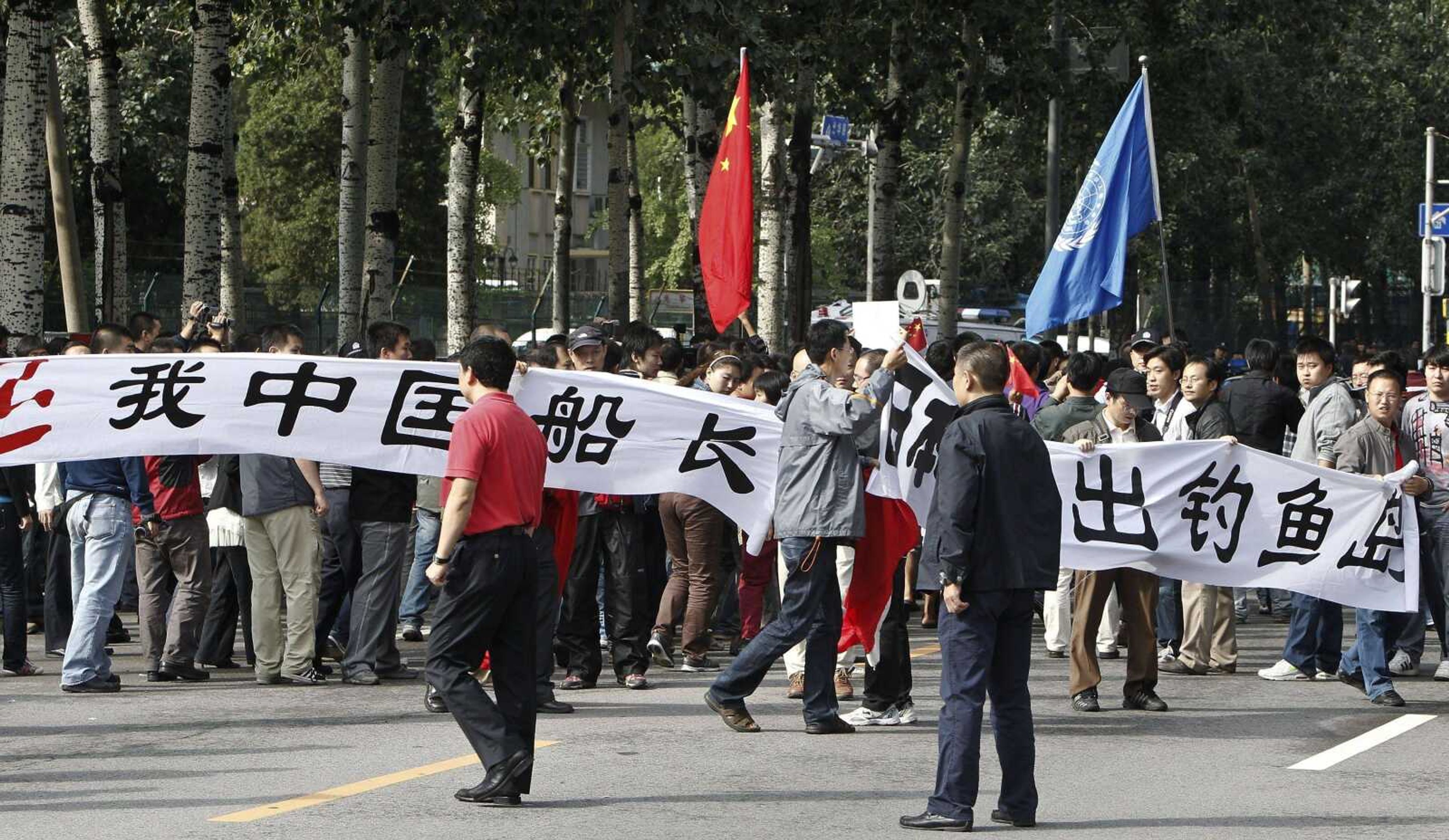Chinese hold anti-Japan protests over boat dispute
BEIJING -- Protesters in several cities across China marked a politically sensitive anniversary with anti-Japan chants and banners, as authorities tried to stop anger over a diplomatic spat between the Asian giants from getting out of control. As some chanted "Wipe out the Japanese devils!" and stamped on Japanese flags, China's Foreign Ministry called for calm...
BEIJING -- Protesters in several cities across China marked a politically sensitive anniversary with anti-Japan chants and banners, as authorities tried to stop anger over a diplomatic spat between the Asian giants from getting out of control.
As some chanted "Wipe out the Japanese devils!" and stamped on Japanese flags, China's Foreign Ministry called for calm.
Ever-present anti-Japanese sentiment in China has been inflamed in recent weeks by Japan's arrest of a Chinese captain after his fishing boat collided with two Japanese coast guard vessels in waters near an island group claimed by both Tokyo and Beijing. Japan has returned the boat and its crew but holds the captain. China has demanded his release.
China's ruling Communist Party partly encourages anti-Japanese sentiment to burnish its nationalist credentials, but it remains obsessed with social stability and had worked in recent days to keep people from demonstrating Saturday, the anniversary of the start of a brutal Japanese invasion in 1931.
Protests in at least five cities drew crowds as large as several hundred, but officials' efforts largely succeeded.
Dozens of demonstrators gathered outside the Japanese Embassy in Beijing shouted "Down with Japan" and held signs saying "Get out of the Diaoyu Islands" but were moved away by police within an hour. They later were allowed to pass by in small groups, while the rest marched outside a police cordon. The disputed islands are known as Diaoyu or Diaoyutai in Chinese and as Senkaku in Japan.
In Shanghai, two men hung a banner outside the Japanese consulate saying "The Diaoyu islands belong to China ... return our captain." Police warned them to be careful and eventually ushered people away after a crowd of about 50 gathered.
"We came here to appeal for fairness and for the right to ask for our captain back. We regret the government's weakness in diplomacy," said one of the men, Li Chunguang. He wore a T-shirt showing revolutionary leader Mao Zedong.
In the southern city of Shenzhen, several hundred people gathered at a public square to call for a boycott of Japanese goods and sing the Chinese national anthem, Hong Kong's radio RTHK reported. Hong Kong's Cable TV showed a police officer trying to grab a Chinese flag displayed by protesters. RTHK said police detained several demonstrators.
Several hundred people protested without interference outside the Japanese consulate and a Japanese department store in Hong Kong, which enjoys Western-style civil liberties as a semiautonomous territory.
Opposition legislator Albert Ho criticized the mainland Chinese government for trying to curb demonstrations.
"We are sad to see many of our compatriots in mainland China are being silenced," Ho told reporters.
Saturday marked the anniversary of the 1931 "Mukden Incident" that led to the Japanese occupation of China's northeast and eventually the invasion and conquest of much of the country. The date has in the past been marked by official commemorations and scattered anti-Japanese protests.
The state-run Xinhua News Agency reported that protesters of the boat incident chanted anti-Japan slogans in the northeastern city of Shenyang, where the 1931 attack occurred. The report ran only in English, not Chinese.
The anniversary was the top news on China Central Television's noon broadcast, but the boat incident wasn't mentioned.
As recently as 2005, some anti-Japan protests have swelled with thousands of demonstrators, threatening to spill public anger into other issues closer to home.
"We believe the Chinese people will express their demands in a rational way," Chinese Foreign Ministry spokeswoman Jiang Yu said Saturday in a statement faxed to The Associated Press.
Authorities in recent days sought to forestall protests. The website of the China Federation for Defending Diaoyutai remained offline Saturday, and messages about organizing protests were largely scrubbed from Internet bulletin boards.
Still, the state-run Chongqing Evening News reported Saturday that hundreds of residents in the southwestern city "spontaneously" gathered to mark the anniversary and sing anti-Japanese songs. The newspaper also reported about 1,000 soldiers, students and others in the northeast city of Changchun gathered in front of a monument marking the "Mukden Incident," vowing to remember history.
Beijing has stated that the arrest of the fishing captain could damage relations and has summoned Japan's ambassador, Uichiro Niwa, five times.
The Japanese government made no public comment Saturday on the protests, the boat incident or the anniversary.
------
Associated Press writers Min Lee in Hong Kong and Shino Yuasa in Tokyo and researcher Henry Hou in Beijing contributed to this report.
Connect with the Southeast Missourian Newsroom:
For corrections to this story or other insights for the editor, click here. To submit a letter to the editor, click here. To learn about the Southeast Missourian’s AI Policy, click here.










